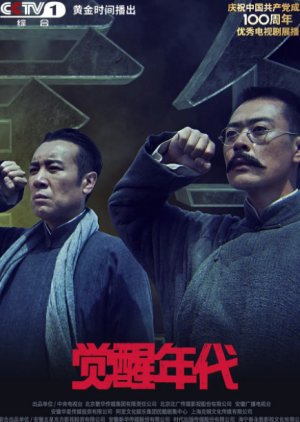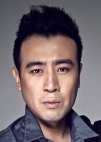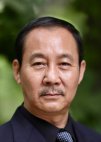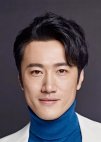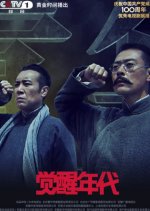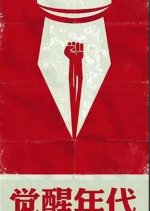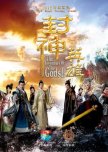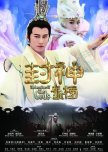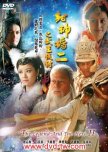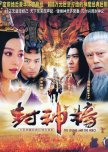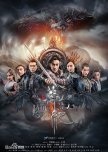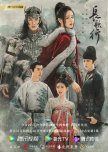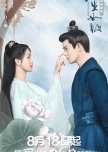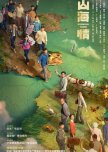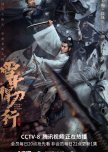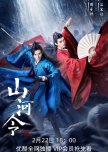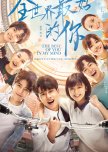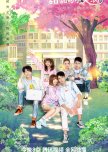During a turbulent time from 1915 to 1921, Chen Du Xiu and Li Da Zhao, along with other like-minded individuals, founded the Magazine La Jeunesse that started the New Culture Movement. The magazine promoted science and democracy and revolutionized the thinking of the masses and encouraged them to fight against imperialism that has been ingrained in everyone. The series follows a colorful cast with various well-known authors, politicians, and revolutionists as they all try in their own way to save their country. (Source: Douban) Edit Translation
- English
- magyar / magyar nyelv
- dansk
- Norsk
- Native Title: 觉醒年代
- Also Known As: The Awakening , 覺醒年代 , The Age of Awakening
- Director: Zhang Yong Xin
- Genres: Historical, Drama
Cast & Credits
- Yu He WeiChen Du XiuMain Role
- Zhang TongLi Da ZhaoMain Role
- Zhang Wan YiChen Yan NianSupport Role
- Ma Qi YueChen Qiao NianSupport Role
- Ma Shao HuaCai Yuan BeiSupport Role
- Zhu Gang Ri YaoHu ShihSupport Role
Reviews

This review may contain spoilers
This drama is a rather different republican drama, it's not about espionage, not about the civil war or fighting against the Japanese, it's not even about glamourous Shanghai. It's set between 1915 till 1921, but majority of the story happen between 1917 till 1919 and revolves around the New Culture Movement (or May Fourth Movement) and mostly set in Peking University. It's about young people trying to find a way to save their country, it's about introducing new ideas and changing customs that had been there for thousand of years.A little background first, Qing Dynasty was overthrown in 1911 and Republic of China was established, but life didn't change much. Most ports and a lot of important railways were under colonial control because China had lost multiple wars in the past century and Qing's government had been on a decline. Even with the new government, it was still rather chaotic times, there were warlords abound (and they continue to be influential and powerful in their various regions until Second Sino-Japanese war), the government was far more interested in infighting and power grabbing (as depicted in multiple cabinet changes throughout the drama), and there were many that wished Qing would come back.
I had imagine the drama would be relatively hard to get into, but it's actually not! The beginning loosely revolved around the creation and publishing of Xinqingnian/New Youth/La Jeunesse, which was a magazine created by our protagonist Chen Duxiu, and promotes science and democracy. It slamed Confucianism and classical Chinese while promoting using vernacular Chinese. It's during these times, the famed Lu Xun wrote his first vernacular Chinese novel, a short story called Diary of a Madman, where the narrator sees the traditional customs as "man-eating". Vernacular Chinese would end up making education much much more accessible to the common people. The drama even had someone that wanted everyone to abandon characters altogether and adopt latin alphabet. While this didn't end up happening, it set the grounds for the modern pinyin system that students use to learn characters \nowadays.
With some of these rather outrageous suggestions, there's of course some opposition, there's some that support the return of the emperor, there's understandably some that doesn't want to abandon thousand year old traditions and customs, there's those that sing praise to beauty and simplification of classical Chinese. These technical "antagonists" were portrayed respectfully and even somewhat adorably. They weren't backwards dimwits, multiple of them were well respected professors who had sound ideas and were remarkable in their respective fields. e,g, Gu Hongming was a notable polyglot and translator who studied for decade and half in UK and knew western culture as well as he knew Chinese culture, but he was a staunch conservative because he deeply believed in preserving the roots, he gave my favourite speech in the entire drama!
Like the movement itself, the drama mentioned and showed various political philosophy. The drama started with students arguing if constitutional monarchy or democracy was better, Hu Shi who idolises experimentalism was prominent part of the drama, anarchism and mutual aid was explore quite a bit through the Chen brothers (Chen Duxiu's sons), and of course Marxism comes into play late in the drama too. Despite my description, the drama wasn't like a dry political lesson, it was times of multiple parties debate and tried to see what fits China, I don't know how to describe the joy of seeing some of these debates. It helped that it featured so many well known people that pioneered or made great contribution to various fields in modern China. Seriously, some one off cameo might be a well known revolutionist :P
The culmination of the New Culture Movement is May Fourth Movement. After end of WWI, Treaty of Versailles was signed, but the German concession in Shandong province was transferred to Japan (due to Twenty One demands that's mentioned in ep 1), instead of given back to China, despite the fact China had sent tens of thousands of workers to the frontlines and contributed greatly to the war. It was the first time in a century that China was part of the victor's side, and everyone had hoped that might be the start of fighting back against colonial control. Unfortunately, the government had failed them, they simply didn't have enough power to demand it back, nor did the other countries care to get involve when it didn't concern them. This caused mass demonstrations all around China, starting with students and not long after workers as well, eventually this led to the government refusing to sign the peace treaty, the first time in recent history where China tried to fight back in diplomacy. May Fourth movement further promoted new ethics system, mobilised students and workers to express their dissatisfaction and protect their interest, led to reorgnisation of KMT, and contributed to the start of Chinese Communist Party.
Normally I wouldn't spend so much time essentially spoilering the show, but this is all history, and rather complicated history that I personally didn't know much about (besides May Fourth), so I thought I'd go over the gist while gushing. It was a lot of fun wiki‘ing while watching the drama, and I'm glad it ended at 1921, since that way the drama was mostly uplifting. I'd say avoid wiki'ing if you don't want to know who meets their early demise (many do), but the drama will tell you when they appear for the last time anyways. The drama was surprisingly light despite the chaotic background and heavy historical basis, the humour was fairly natural and the characters were mostly very smart even though they argued a lot, the young people were super relatable and a fair few end up being world changing. These were 90s and 00s kids of the previous century and I can't begin to imagine doing some of the amazing things they do despite being the same age or even younger.
I actually love so many of the characters that I don't know where to begin, the Chen brothers were probably my favourite though, since they were rarely portrayed in dramas before this. They were resilient and idealistic, had a rather complicated relationship with their father that was portrayed pretty thoroughly throughout the drama. It's one of the biggest deviation from actual history, historically they would have been estranged for most part of their lives, and they likely wouldn't have been around for most the drama if it stuck closer to history. Zhang Wanyi and Ma Qiyue did amazing in this drama, I look forward to Zhang Wanyi's role in Daylight Ent's drama with Bai Yu + Mao Xiaotong + Song Zu'er, Ma Qiyue was only 14 when he played Qiaonian (who's 13~18 in the drama) so he has a bright future ahead of him! The acting was all around splendid, especially Yu Hewei who played Chen Duxiu amazingly (and won Magnolia award for it woohoo!) and Ma Shaohua who played the adorable University principal Cai Yuanpei that facilitate the awesome environment where various ideals could flourish.
Unfortunately, one of the few female characters with significant role started off rather terribly, playing a spoilt and unreasonable girl, she comes around rather quickly but it was jarring. I think her acting/her character was one of the few flaws of the drama, but she still have some shining scenes here and there, most notably a play that acts out the debates they've been having and notes the oppression that women have been facing. The other minor flaw was female characters don't get much screen time, a lot of well known female revolutionists weren't in Beijing at the time (they were in France or Hunan province, there are other dramas that do feature them), and they mostly weren't relevant to New Culture Movement. The few older women around were wives regulated to homemaking roles (despite one being educated and could be portrayed less stereotypically), younger women tend to play more active roles (all fictionalised) since students were first supporters of the movement.
Lastly, I must applaud the drama for the absolutely spectacular directing! Hot damn, I was big fan of the director after Advisor Alliance (do rec! Fun retelling of Three kingdoms!), but now I'm a super fan and will gobble everything Zhang Yongxin puts out (also got a Magnolia!). He has amazing eye for framing shots, he filled the drama with symbolism that I don't know how to interpret sometimes. I loved the astounding sequence that introduced Lu Xun and clearly referenced his story "Medicine", the goose bump inducing scene of Li Dazhao encountering a crying bride without a groom (likely a ghost marriage), the incredible usage of wide angle shots + heavy clouds to create heart aching scene that broke Chen Duxiu near the end of the drama, and of course the montage of Chen brothers as they leave for France stayed with me months after I finished the drama. The soundtrack was super memorable, the distinctive art used to denotes some important events was gorgeous, and I just love the aesthetics of the drama in general.
I've been sitting on this review for whooping 3 months because I don't know how to begin, I feel like all my words pale in comparison, sometimes explaining a scene without seeing it seems to make it lose all of its magic. This is the first time I found the entire drama just screams art to me, and I love it so so much that I want to recommend it to everyone. Please give it a try! I'm dump some interesting tidbits in the comment below, may or may not be spoilery.
Was this review helpful to you?
Recommendations
There have been no recommendations submitted. Be the first and add one.
Recent Discussions
| Title | Replies | Views | Latest Post | |
|---|---|---|---|---|
| Translating 觉醒年代 Age of Awakening by hanfei | 3 | 0 | flours Sep 1, 2021 | |

